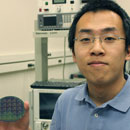

Azadeh Ansari Receives ProQuest Distinguished Dissertation Award for Research in GaN-based Electro-acoustic Devices Dr. Azadeh Ansari received a 2017 ProQuest Distinguished Dissertation Award for her dissertation, GaN Integrated Microsystems for RF Applications. This award recognizes exceptional dissertations of outstanding scholarly quality in any field of study. The focus of her dissertation was the design, fabrication, and characterization of novel and advanced electro-acoustic devices and integrated micro/nano systems based on Gallium Nitride (GaN). GaN is the material that led to the development of new high-efficiency lighting and was the focus of the Nobel Prize in Physics in 2014. [Full Story] Muzhi Wang Earns a Best Paper Award for a New Tunable Filter for Wireless Communication Devices Muzhi Wang, third year PhD student in ECE, has earned a Best Paper Award at the 2016 Meeting on Silicon Monolithic Integrated Circuits in RF Systems (SiRF) for his implementation of the first tunable filter for wireless communications to use a germanium-telluride phase change switch. [Full Story] 2016 EECS Outstanding Achievement Awards The EECS Outstanding Achievement Awards are presented annually to faculty members for their outstanding accomplishments in teaching, research, and service. The recipients of the 2016 EECS Outstanding Achievement Award are Prof. Anthony Grbic, Dr. David Paoletti, Prof. Mina Rais-Zadeh, and Prof. Thomas F. Wenisch. [Full Story] Mina Rais-Zadeh Receives 2015 IEEE Sensors Council Technical Achievement Award for Research in N/MEMS Professor Mina Rais-Zadeh has been awarded the 2015 IEEE Sensors Council Technical Achievement Award, "For pioneering research in sensors technology: adaptable nano/micro-electromechanical systems (N/MEMS)." This early career award honors individuals with outstanding technical contributions within the scope of the IEEE Sensors Council. [Full Story] 2014 Promotions of our Faculty Congratulations to the following faculty who received promotions this year: Valeria Bertacco, Jason Flinn, Satish Narayanasamy, Edwin Olson, Mina Rais-Zadeh, and Zhaohui Zhong. Keep up the great work! [Full Story] MEMS Research by Muzhi Wang Recognized at IMS 2014 ECE graduate student Muzhi Wang received a best student paper award, honorable mention, at the 2014 IEEE International Microwave Symposium (IMS2014) for his research in RF MEMS switches for high-power RF applications. [Full Story] Mina Rais-Zadeh Receives 2014 ONR Young Investigator Program (YIP) Award Prof. Mina Rais-Zadeh received a 2014 Young Investigator Award from the Office of Naval Research (ONR) for her research project, Acoustic Phonons and Their Interactions with Electrons in Gallium Nitride Ultra-fast Ultra-scaled Resonators. [Full Story] When GPS fails, this speck of an electronic device could step in In a pellet of glass the size of an apple seed, Electrical and Computer Engineering researchers have packed seven devices that together could potentially provide navigation in the absence of the satellite-based Global Positioning System (GPS.) [Full Story] MEMS Research Recognized with Best Poster Award at 2013 Transducers Conference Doctoral students Zhengzheng Wu, Vikram Thakar, Adam Peczalski, and their advisor Prof. Mina Rais-Zadeh received a Best Poster Award at the 17th Int. Conference on Solid-State Sensors, Actuators and Microsystems for their paper, "A low phase-noise Pierce oscillator using a piezoelectric-on-silica micromechanical resonator." The paper reports on a high-performance electrical oscillator using a fused silica micro-electromechanical resonator. [Full Story] Prof. Mina Rais-Zadeh Selected to Participate in 2013 U.S. Frontiers of Engineering Symposium Prof. Rais-Zadeh is one of about 100 outstanding young engineers selected to participate in the 2013 US Frontiers of Engineering Symposium, sponsored by the National Academy of Engineering. The symposium will be held Sept. 19-21 in Delaware, and the main topics are: Designing and Analyzing Societal Networks, Cognitive Manufacturing, Energy, and Flexible Electronics. [NAE press release] Mina Rais-Zadeh Receives NASA Early Career Grant to Develop Technology Needed in PicoSatellites Prof. Mina Rais-Zadeh will pursue research into a "Chip-Scale Precision Timing Unit for PicoSatellites" as one of ten researchers selected in the inaugural year of NASA's Space Technology Research Opportunities for Early Career Faculty. [Full Story] Mina Rais-Zadeh Receives 2011 EDS Early Career Award Prof. Mina Rais-Zadeh has been selected to receive a 2011 IEEE Electron Devices Society (EDS) Early Career Award, which honors an outstanding IEEE EDS Graduate of the Last Decade (GOLD). Her research has been focused on the development of a new class of passive RF MEMS technology, which has resulted in five patents and several publications. [Full Story] Mina Rais-Zadeh Receives NSF CAREER Award Prof. Rais-Zadeh will pursue research in the area of MEMS Reconfigurable Filters for Multi-Band Low-Power Radios. [Full Story] |